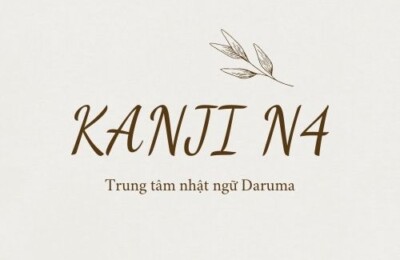Đây là bài viết tổng hợp về Kanji N5. Kanji N5 là một trong những Kanji…
Kanji N3 – Soumatome N3 Kanji -Tổng Hợp Kanji N3
Kanji N3 – Soumatome N3 Kanji -Tổng Hợp Kanji N3

Xem thêm:
Kanji N3 – Soumatome N3 Kanji -Tổng Hợp Kanji N3 tiếng Việt
Tuần 2 Ngày 1
| ①準 | CHUẨN | じゅん | |
| 準備 | CHUẨN BỊ | じゅんび | Chuẩn bị |
| ②備 | BỊ | び/そな・える | |
| 準備 | CHUẨN BỊ | じゅんび | Chuẩn bị |
| 備える | BỊ | そなえる | Chuẩn bị |
| ③営 | DOANH | えい | |
| 営業 | DOANH NGHIỆP | えいぎょう | Kinh doanh, doanh nghiệp |
| ④閉 | BẾ | へい///し・まる/し・める | |
| 開閉 | KHAI BẾ | かいへい | Mở và đóng |
| 閉まる | BẾ | しまる | Đóng (tự động từ) |
| 閉める | BẾ | しめる | Đóng (tha động từ) |
| ⑤案 | ÁN | あん | Đề án, đề nghị |
| 案内 | ÁN NỘI | あんない | Hướng dẫn, thông tin |
| ⑥内 | NỘI | ない/うち | |
| 家内 | GIA NỘI | かない | Vợ |
| 以内 | DĨ NỘI | いない | trong vòng |
| 内側 | NỘI TRẮC | うちがわ | Phía trong |
| 国内 | QUỐC NỘI | こくない | Trong nước |
| ⑦予 | DỰ | よ | |
| 予定 | DỰ ĐỊNH | よてい | Dự định |
| 予習 | DỰ TẬP | よしゅう | Học trước bài, chuẩn bị trước |
| ⑧約 | ƯỚC | やく | |
| 予約 | DỰ ƯỚC | よやく | Cuộc hẹn, đặt trước |
| 約~ | ƯỚC | やく | Khoảng, ước chừng ~ |
Tuần 2 Ngày 2
| ①煙 | YÊN | えん/けむり | |
| 禁煙 | CẤM YÊN | きんえん | Cấm hút thuốc |
| 煙 | YÊN | けむり | Khói |
| ②当 | ĐƯƠNG | とう/あ・たる | |
| 本当 | BẢN ĐƯƠNG | ほんとう | Thật, sự thật |
| 当たる | ĐƯƠNG | あたる | Trúng, đúng |
| 当たり前 | ĐƯƠNG TIỀN | あたりまえ | Đương nhiên là |
| ③全 | TOÀN | ぜん | |
| 全部 | TOÀN BỘ | ぜんぶ | Toàn bộ |
| 全席 | TOÀN TỊCH | ぜんせき | Toàn bộ ghế |
| 安全(な) | AN TOÀN | あんぜん | An toàn |
| ④客 | KHÁCH | きゃく | |
| 客 | KHÁCH | きゃく | Khách |
| お客様 | KHÁCH DẠNG | おきゃくさま | Quý khách |
| ⑤様 | DẠNG | さま |
| 様子 | DẠNG TỬ | ようす | Bộ dạng, tình trạng |
| ○○様 | DẠNG | さま | Ngài ~ |
| ⑥解 | GIẢI | かい | |
| 理解 | LÝ GIẢI | りかい | Hiểu |
| 解説 | GIẢI THUYẾT | かいせつ | Sự giải thích |
| 解答 | GIẢI ĐÁP | かいとう | Đáp án |
| 分解 | PHÂN GIẢI | ぶんかい | Tháo rời, tách rời |
| ⑦協 | HIỆP | きょう | |
| 協力 | HIỆP LỰC | きょうりょく | Hợp tác, cộng tác |
| ⑧願 | NGUYỆN | ねが・う | |
| 願う | NGUYỆN | ねがう | Cầu nguyện |
Tuần 2 Ngày 3
| ①観 | QUAN | かん | |
| 観光 | QUAN QUANG | かんこう | Tham quan |
| 観客 | QUAN KHÁCH | かんきゃく | Quan khách, người tham quan, du lịch |
| ②園 | VIÊN | えん | |
| 動物園 | ĐỘNG VẬT VIÊN | どうぶつえん | Sở thú |
| ③港 | CẢNG | こう/みなと | |
| 空港 | KHÔNG CẢNG | くうこう | Sân bay |
| ○○港 | CẢNG | こう | Cảng~ |
| 港 | CẢNG | みなと | Cảng |
| ④遊 | DU | ゆう/あそ・ぶ | |
| 遊園地 | DU VIÊN ĐỊA | ゆうえんち | Khu vui chơi |
| 遊ぶ | DU | あそぶ | Vui chơi, chơi |
| ⑤美 | MỸ | び/うつく・しい | |
| 美術館 | MỸ THUẬT QUÁN | びじゅつかん | Bảo tàng mỹ thuật |
| 美人 | MỸ NHÂN | びじん | Mỹ nhân |
| 美しい | MỸ | うつくしい | Xinh đẹp |
| ⑥術 | THUẬT | じゅつ | |
| 美術 | MỸ THUẬT | びじゅつ | Mỹ thuật |
| 技術 | KỸ THUẬT | ぎじゅつ | Kỹ thuật |
| 手術 | THỦ THUẬT | しゅじゅつ | Phẫu thuật |
| ⑦神 | THẦN | かみ しん/じん | |
| 神社 | THẦN XÃ | じんじゃ | Đền thờ |
| 神経質(な) | THẦN KINH CHẤT | しんけいしつ | Nhạy cảm |
| 神様 | THẦN DẠNG | かみさま | Thần, vị thần |
| ⑧寺 | TỰ | じ/てら | |
| ○○寺 | TỰ | じ | Chùa~ |
| お寺 | TỰ | おてら | Ngôi chùa |
Tuần 2 Ngày 4
| ①役 | DỊCH | やく | |
| 市役所 | THỊ DỊCH SỞ | しやくしょ | Cơ quan hành chính |
| 役に立つ | DỊCH LẬP | やくにたつ | Có ích, có lợi |
| 役員 | DỊCH VIÊN | やくいん | Viên chức, cán bộ |
| ②郵 | BƯU | ゆう | |
| 郵便 | BƯU TIỆN | ゆうびん | Bưu điện, dịch vụ bưu điện |
| ③局 | CỤC | きょく | |
| 郵便局 | BƯU TIỆN CỤC | ゆうびんきょく | Bưu điện, bưu cục |
| 薬局 | DƯỢC CỤC | やっきょく | Nhà thuốc |
| ④交 | GIAO | こう | |
| 交番 | GIAO PHIÊN | こうばん | Đồn cảnh sát |
| 交通 | GIAO THÔNG | こうつう | Giao thông |
| 交換 | GIAO HOÁN | こうかん | Trao đổi, đổi |
| ⑤差 | SAI | さ/さ・し | |
| 差 | SAI | さ | Khoảng cách, sự khác biệt |
| 差し出す | SAI | さしだす | Đưa ra, vươn ra |
| 差出人 | SAI | さしだしにん | Người gửi |
| ⑥点 | ĐIỂM | てん | |
| 交差点 | GIAO SAI ĐIỂM | こうさてん | Ngã tư |
| 点数 | ĐIỂM SỐ | てんすう | Điểm số |
| ~点 | ĐIỂM | てん | Điểm |
| ⑦橋 | KIỀU | はし/きょう |
| 歩道橋 | BỘ ĐẠO KIỀU | ほどうきょう | Cầu đi bộ, cầu vượt |
| 橋 | KIỀU | はし | Cầu |
| ⑧公 | CÔNG | こう | |
| 公園 | CÔNG VIÊN | こうえん | Công viên |
Tuần 2 Ngày 5
| ①受 | THỤ | じゅ/う・ける | ||
| 受信 | THỤ TÍN | じゅしん | Nhận (tin, email…) | |
| 受験 | THỤ NGHIỆM | じゅけん | Tham dự thi | |
| 受ける | THỤ | うける | Nhận | |
| ②付 | PHÓ | つ・く/つ・ける | ||
| 付ける | PHÓ | つける | Gắn lên, đính lên (tha động từ) | |
| 片付ける | PHIẾN PHÓ | かたづける | Dọn dẹp | |
| 受付 | THỤ PHÓ | うけつけ | Tiếp tân | |
| 付く | PHÓ | つく | Dính (tự động từ) | |
| ③科 | KHOA | か | ||
| 科学 | KHOA HỌC | かがく | Khoa học |
| 外科 | NGOẠI KHOA | げか | Ngoại khoa |
| 内科 | NỘI KHOA | ないか | Nội khoa |
| 教科書 | GIÁO KHOA THƯ | きょうかしょ | sách giáo khoa |
| ④鼻 | TỴ | はな/び | |
| 耳鼻科 | NHĨ TỴ KHOA | じびか | Khoa tai mũi họng |
| 鼻 | TỴ | はな | Mũi |
| ⑤婦 | PHỤ | ふ | |
| 婦人 | PHỤ NHÂN | ふじん | Phụ nữ |
| 産婦人科 | SẢN PHỤ NHÂN KHOA | さんふじんか | Khoa sản phụ |
| 主婦 | CHỦ PHỤ | しゅふ | Vợ |
| ⑥形 | HÌNH | けい/ぎょう/かたち | |
| 形式 | HÌNH THỨC | けいしき | Hình thức |
| 図形 | ĐỒ HÌNH | ずけい | Đồ thị, đồ hình, hình vẽ |
| 整形外科 | CHỈNH HÌNH NGOẠI KHOA | せいけいげか | Khoa chỉnh hình |
| 人形 | NHÂN HÌNH | にんぎょう | Búp bê |
| 形 | HÌNH | かたち | Hình dạng |
| ⑦骨 | CỐT | こつ/ほね | |
| 骨折 | CỐT CHIẾT | こっせつ | Gãy xương |
| 骨 | CỐT | ほね | Xương |
| ⑧折 | CHIẾT | せつ/おる | |
| 右折 | HỮU CHIẾT | うせつ | Rẽ phải |
| 左折 | TẢ CHIẾT | させつ | Rẽ trái |
| 折る | CHIẾT | おる | Bẻ, gấp (tha động từ) |
| 折り紙 | CHIẾT CHỈ | おりがみ | Môn gấp giấy |
| 折れる | CHIẾT | おれる | Bị bẻ, gấp (tự động từ) |
Tuần 2 Ngày 6
| ①困 | KHỐN | こ・まる | |
| 困る | KHỐN | こまる | Khốn khó, khổ cực |
| ②消 | TIÊU | しょう き・える/け・す | |
| 消す | TIÊU | けす | Dập tắt, xóa (tha động từ) |
| 消防 | TIÊU PHÒNG | しょうぼう | Phòng cháy, cứu hỏa | |
| 消える | TIÊU | きえる | Bị xóa, bị dập (tự động từ) | |
| 消しゴム | TIÊU | けしごむ | Cục tẩy | |
| ③防 | PHÒNG | ぼう/ふせ・ぐ | ||
| 予防 | DỰ PHÒNG | よぼう | Dự phòng | |
| 防ぐ | PHÒNG | ふせぐ | Đề phòng, ngăn chặn | |
| ④救 | CỨU | きゅう/すく・う | ||
| 救急車 | CỨU CẤP XA | きゅうきゅうしゃ | Xe cứu thương | |
| 救う | CỨU | すくう | Cứu giúp | |
| ⑤警 | CẢNH | けい | ||
| 警官 | CẢNH QUAN | けいかん | Cảnh sát viên | |
| ⑥察 | SÁT | さつ | ||
| 警察 | CẢNH SÁT | けいさつ | Cánh sát | |
| 警察署 | CẢNH SÁT THỰ | けいさつしょ | Sở cảnh sát | |
| ⑦故 | CỐ | こ | ||
| 事故 | SỰ CỐ | じこ | Sự cố, tai nạn | |
| 故障 | CỐ CHƯỚNG | こしょう | Sự hỏng hóc, trục trặc |
| 故○○ | CỐ | こ | (Tên Người.)…quá cố |
| ⑧伝 | TRUYỀN | でん/つた・える | |
| 伝言 | TRUYỀN NGÔN | でんごん | Tin nhắn, lời nhắn |
| 伝える | TRUYỀN | つたえる | Truyền đạt |
| 手伝う | THỦ TRUYỀN | てつだう | Giúp đỡ |
Download kanji n3 soumatome tại đây: kanji n3 soumatome




This Post Has 0 Comments